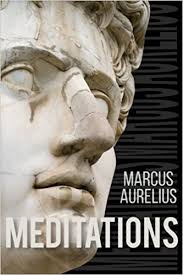Meditations Page #9
Meditations is a series of personal writings by Marcus Aurelius, Roman Emperor from 161 to 180 AD, recording his private notes to himself and ideas on Stoic philosophy. Marcus Aurelius wrote the 12 books of the Meditations in Koine Greek as a source for his own guidance and self-improvement.
VIII. Whatsoever thou dost affect, whatsoever thou dost project, so do, and so project all, as one who, for aught thou knowest, may at this very present depart out of this life. And as for death, if there be any gods, it is no grievous thing to leave the society of men. The gods will do thee no hurt, thou mayest be sure. But if it be so that there be no gods, or that they take no care of the world, why should I desire to live in a world void of gods, and of all divine providence? But gods there be certainly, and they take care for the world; and as for those things which be truly evil, as vice and wickedness, such things they have put in a man's own power, that he might avoid them if he would: and had there been anything besides that had been truly bad and evil, they would have had a care of that also, that a man might have avoided it. But why should that be thought to hurt and prejudice a man's life in this world, which cannot any ways make man himself the better, or the worse in his own person? Neither must we think that the nature of the universe did either through ignorance pass these things, or if not as ignorant of them, yet as unable either to prevent, or better to order and dispose them. It cannot be that she through want either of power or skill, should have committed such a thing, so as to suffer all things both good and bad, equally and promiscuously, to happen unto all both good and bad. As for life therefore, and death, honour and dishonour, labour and pleasure, riches and poverty, all these things happen unto men indeed, both good and bad, equally; but as things which of themselves are neither good nor bad; because of themselves, neither shameful nor praiseworthy. IX. Consider how quickly all things are dissolved and resolved: the bodies and substances themselves, into the matter and substance of the world: and their memories into the general age and time of the world. Consider the nature of all worldly sensible things; of those especially, which either ensnare by pleasure, or for their irksomeness are dreadful, or for their outward lustre and show are in great esteem and request, how vile and contemptible, how base and corruptible, how destitute of all true life and being they are. X. It is the part of a man endowed with a good understanding faculty, to consider what they themselves are in very deed, from whose bare conceits and voices, honour and credit do proceed: as also what it is to die, and how if a man shall consider this by itself alone, to die, and separate from it in his mind all those things which with it usually represent themselves unto us, he can conceive of it no otherwise, than as of a work of nature, and he that fears any work of nature, is a very child. Now death, it is not only a work of nature, but also conducing to nature. XI. Consider with thyself how man, and by what part of his, is joined unto God, and how that part of man is affected, when it is said to be diffused. There is nothing more wretched than that soul, which in a kind of circuit compasseth all things, searching (as he saith) even the very depths of the earth; and by all signs and conjectures prying into the very thoughts of other men's souls; and yet of this, is not sensible, that it is sufficient for a man to apply himself wholly, and to confine all his thoughts and cares to the tendance of that spirit which is within him, and truly and really to serve him. His service doth consist in this, that a man keep himself pure from all violent passion and evil affection, from all rashness and vanity, and from all manner of discontent, either in regard of the gods or men. For indeed whatsoever proceeds from the gods, deserves respect for their worth and excellency; and whatsoever proceeds from men, as they are our kinsmen, should by us be entertained, with love, always; sometimes, as proceeding from their ignorance, of that which is truly good and bad, (a blindness no less, than that by which we are not able to discern between white and black:) with a kind of pity and compassion also. XII. If thou shouldst live three thousand, or as many as ten thousands of years, yet remember this, that man can part with no life properly, save with that little part of life, which he now lives: and that which he lives, is no other, than that which at every instant he parts with. That then which is longest of duration, and that which is shortest, come both to one effect. For although in regard of that which is already past there may be some inequality, yet that time which is now present and in being, is equal unto all men. And that being it which we part with whensoever we die, it doth manifestly appear, that it can be but a moment of time, that we then part with. For as for that which is either past or to come, a man cannot be said properly to part with it. For how should a man part with that which he hath not? These two things therefore thou must remember. First, that all things in the world from all eternity, by a perpetual revolution of the same times and things ever continued and renewed, are of one kind and nature; so that whether for a hundred or two hundred years only, or for an infinite space of time, a man see those things which are still the same, it can be no matter of great moment. And secondly, that that life which any the longest liver, or the shortest liver parts with, is for length and duration the very same, for that only which is present, is that, which either of them can lose, as being that only which they have; for that which he hath not, no man can truly be said to lose. XIII. Remember that all is but opinion and conceit, for those things are plain and apparent, which were spoken unto Monimus the Cynic; and as plain and apparent is the use that may be made of those things, if that which is true and serious in them, be received as well as that which is sweet and pleasing. XIV. A man's soul doth wrong and disrespect itself first and especially, when as much as in itself lies it becomes an aposteme, and as it were an excrescency of the world, for to be grieved and displeased with anything that happens in the world, is direct apostacy from the nature of the universe; part of which, all particular natures of the world, are. Secondly, when she either is averse from any man, or led by contrary desires or affections, tending to his hurt and prejudice; such as are the souls of them that are angry. Thirdly, when she is overcome by any pleasure or pain. Fourthly, when she doth dissemble, and covertly and falsely either doth or saith anything. Fifthly, when she doth either affect or endeavour anything to no certain end, but rashly and without due ratiocination and consideration, how consequent or inconsequent it is to the common end. For even the least things ought not to be done, without relation unto the end; and the end of the reasonable creatures is, to follow and obey him, who is the reason as it were, and the law of this great city, and ancient commonwealth.
Translation
Translate and read this book in other languages:
Select another language:
- - Select -
- 简体中文 (Chinese - Simplified)
- 繁體中文 (Chinese - Traditional)
- Español (Spanish)
- Esperanto (Esperanto)
- 日本語 (Japanese)
- Português (Portuguese)
- Deutsch (German)
- العربية (Arabic)
- Français (French)
- Русский (Russian)
- ಕನ್ನಡ (Kannada)
- 한국어 (Korean)
- עברית (Hebrew)
- Gaeilge (Irish)
- Українська (Ukrainian)
- اردو (Urdu)
- Magyar (Hungarian)
- मानक हिन्दी (Hindi)
- Indonesia (Indonesian)
- Italiano (Italian)
- தமிழ் (Tamil)
- Türkçe (Turkish)
- తెలుగు (Telugu)
- ภาษาไทย (Thai)
- Tiếng Việt (Vietnamese)
- Čeština (Czech)
- Polski (Polish)
- Bahasa Indonesia (Indonesian)
- Românește (Romanian)
- Nederlands (Dutch)
- Ελληνικά (Greek)
- Latinum (Latin)
- Svenska (Swedish)
- Dansk (Danish)
- Suomi (Finnish)
- فارسی (Persian)
- ייִדיש (Yiddish)
- հայերեն (Armenian)
- Norsk (Norwegian)
- English (English)
Citation
Use the citation below to add this book to your bibliography:
Style:MLAChicagoAPA
"Meditations Books." Literature.com. STANDS4 LLC, 2025. Web. 23 Feb. 2025. <https://www.literature.com/book/meditations_76>.








Discuss this Meditations book with the community:
Report Comment
We're doing our best to make sure our content is useful, accurate and safe.
If by any chance you spot an inappropriate comment while navigating through our website please use this form to let us know, and we'll take care of it shortly.
Attachment
You need to be logged in to favorite.
Log In